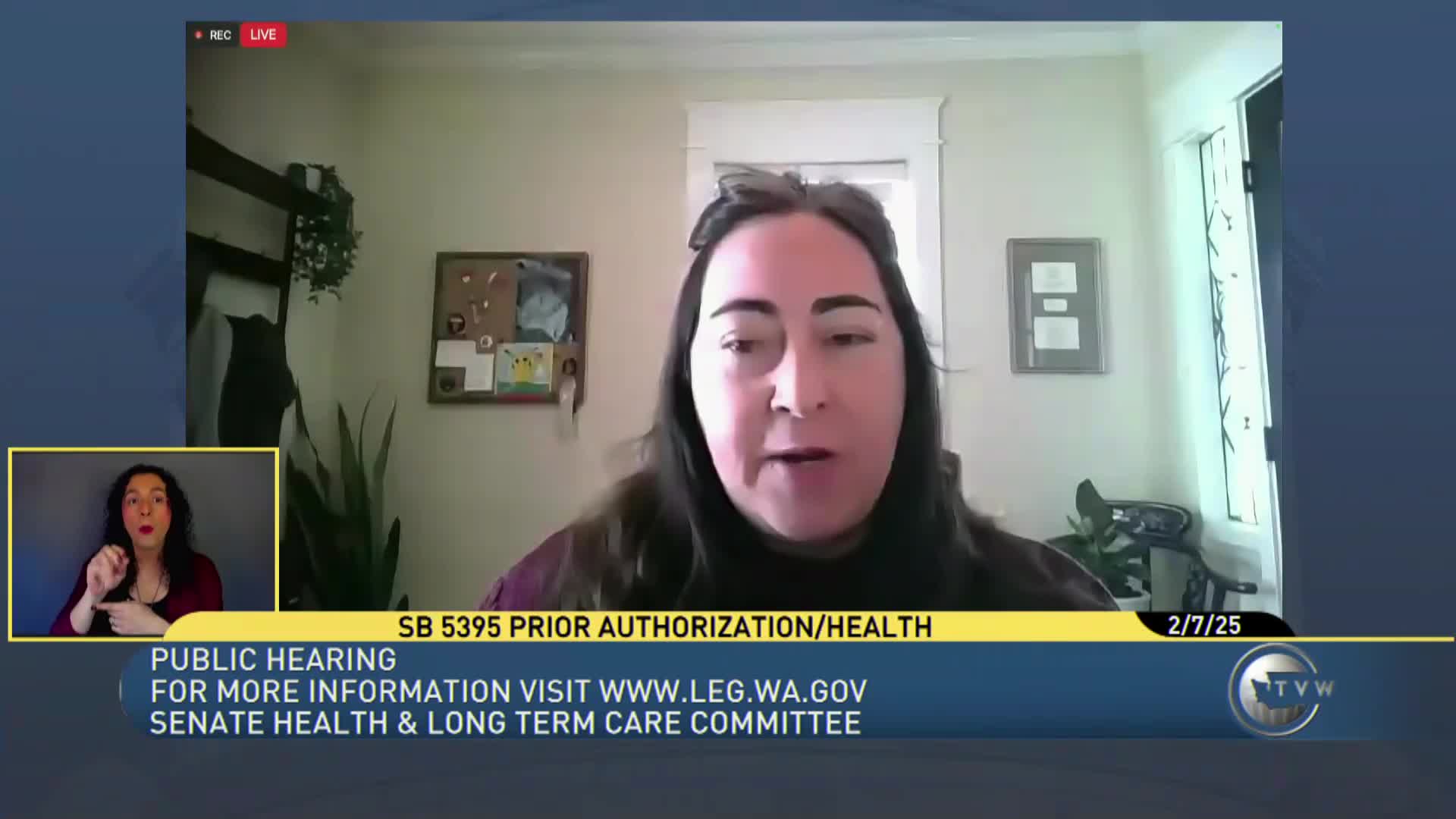Senate hears bill to tighten prior‑authorization transparency, limit AI‑only denials and require peer‑to‑peer access
February 07, 2025 | Health & Long Term Care, Senate, Legislative Sessions, Washington
This article was created by AI summarizing key points discussed. AI makes mistakes, so for full details and context, please refer to the video of the full meeting. Please report any errors so we can fix them. Report an error »

Senate Bill 5,395, a bill to improve transparency and accountability in the prior‑authorization process, drew broad testimony Feb. 7 before the Senate Health & Long Term Care Committee.
Sponsor Tina Orwall said the bill is intended to make prior‑authorization decisions more transparent, timely and clinical. “There’s been an increased number of things requiring pre‑approval, higher claims being denied and the use of AI in some of those processes,” Orwall said, and the bill seeks to clarify procedures and guardrails so patients get timely care.
Under the draft, when a carrier issues a prior‑authorization determination the carrier must include a unique identifier for the individual who initially reviewed the request and provide the NPI and credentials of the physician who provided clinical oversight. The bill would also require peer‑to‑peer discussions for adverse determinations with an available clinician who has authority to overturn the decision, prohibit AI or algorithmic tools from being the sole means to deny or delay care, and prohibit retrospective denials that would otherwise be treated as adverse benefit determinations under the appeals process. The measure would also create several reporting requirements and require HCA to identify services that do not require prior authorization by July 2027.
Supporters — including physicians, hospitals and patient advocates — told the committee that prior authorization can delay care and that peer‑to‑peer access and reviewer transparency would reduce unnecessary denials and administrative burden. Dr. Addison Stone, an orthopedic spine surgeon, said his practice saw a 40% increase in prior‑authorization denials over two years and attributed part of the rise to automated denials. Hospital witnesses described cases where services were preapproved but later retroactively rescinded, creating financial and administrative burdens for patients and providers.
Insurers and some integrated health systems opposed or sought changes to portions of the bill. Plans warned the proposal could increase operating costs and said current enforcement tools already exist, and they sought narrower language around reporting, reviewer identification and annual policy update limits. Carriers also warned that requiring highly specialized peer‑to‑peer reviewers for denials could require material staffing increases and added costs for managed care plans.
Ending: The committee heard detailed testimony on both patient harms and operational impacts, and members asked stakeholders to continue discussions on definitions, scope and cost before any vote.
Sponsor Tina Orwall said the bill is intended to make prior‑authorization decisions more transparent, timely and clinical. “There’s been an increased number of things requiring pre‑approval, higher claims being denied and the use of AI in some of those processes,” Orwall said, and the bill seeks to clarify procedures and guardrails so patients get timely care.
Under the draft, when a carrier issues a prior‑authorization determination the carrier must include a unique identifier for the individual who initially reviewed the request and provide the NPI and credentials of the physician who provided clinical oversight. The bill would also require peer‑to‑peer discussions for adverse determinations with an available clinician who has authority to overturn the decision, prohibit AI or algorithmic tools from being the sole means to deny or delay care, and prohibit retrospective denials that would otherwise be treated as adverse benefit determinations under the appeals process. The measure would also create several reporting requirements and require HCA to identify services that do not require prior authorization by July 2027.
Supporters — including physicians, hospitals and patient advocates — told the committee that prior authorization can delay care and that peer‑to‑peer access and reviewer transparency would reduce unnecessary denials and administrative burden. Dr. Addison Stone, an orthopedic spine surgeon, said his practice saw a 40% increase in prior‑authorization denials over two years and attributed part of the rise to automated denials. Hospital witnesses described cases where services were preapproved but later retroactively rescinded, creating financial and administrative burdens for patients and providers.
Insurers and some integrated health systems opposed or sought changes to portions of the bill. Plans warned the proposal could increase operating costs and said current enforcement tools already exist, and they sought narrower language around reporting, reviewer identification and annual policy update limits. Carriers also warned that requiring highly specialized peer‑to‑peer reviewers for denials could require material staffing increases and added costs for managed care plans.
Ending: The committee heard detailed testimony on both patient harms and operational impacts, and members asked stakeholders to continue discussions on definitions, scope and cost before any vote.
View full meeting
This article is based on a recent meeting—watch the full video and explore the complete transcript for deeper insights into the discussion.
View full meeting
